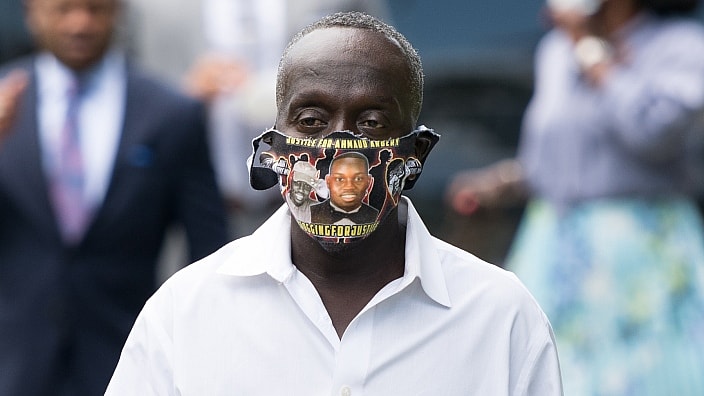The family of Ahmaud Arbery visited the site of his death as proceedings in the case against the three men accused of his murder began to ramp up.
According to a report from The Atlanta Journal-Constitution, three busloads of Arbery family members left the court and arrived at Satilla Drive in the Satilla Shores neighborhood late last week.

“This is where his blood was spilled,” one woman in the group said. “It’s sacred ground, right here.”
Jury selection in the trial of Travis McMichael, his father, Greg McMichael, and their friend and neighbor William “Roddie” Bryan began on Oct. 18. The trial is set to take place in Glynn County, Georgia, which is where Arbery was killed in Brunswick, a city with a population of 16,000.
Ahmaud’s father, Marcus Arbery, and his sisters, Ruby and Dianne, had been holding a vigil in front of the Glynn County courthouse as jury selection got underway. According to The AJC, they “chanted, shouted, sang and, at times, cried” as the process took place. A full jury of 12 people and four alternates has not yet been chosen.
Marcus Arbery has been speaking up for his son in the wake of the 25-year-old victim’s murder.
“But that’s what a dad’s supposed to do. Step up,” Marcus Arbery said. “He can’t talk no more. He’s in a grave. Why? Because of his skin color. But he’s got a strong daddy, and I’m gonna fight to the end for him.”
The McMichaels hunted Ahmaud Arbery down on the afternoon of Feb. 23, 2020, as he was leaving a house that was under construction and that they claimed had been previously robbed. They attempted to make a citizen’s arrest and cornered the jogger, pinning him in with pickup trucks and armed with shotguns. As Arbery lunged to wrestle a gun away from Travis McMichael, he was shot three times point-blank.
After the shooting, the state of Georgia finally passed a hate crimes law, and months later — with Arbery’s mother, Wanda Cooper-Jones, at his side — Gov. Brian Kemp repealed the citizen’s arrest law that had been enacted in the late 1800s to allow the capture of runaway slaves.
As the grieving group of Ahmaud Arbery’s family, friends and supporters gathered at the spot where he was killed, his father maintained that he had walked that street countless times.
“It gets no easier going to where you lost your child at,” Marcus Arbery told The AJC. “I lost my child to three white men. I can’t really explain that. I can’t tell you what that’s like. I’m still mad, and I’m still emotional, and I’m going to be like that for the rest of my life. That’s something that I will never forget. And I will never forgive those three men.”
Have you subscribed to theGrio podcasts “Dear Culture” or “Acting Up?” Download our newest episodes now!
TheGrio is now on Apple TV, Amazon Fire and Roku. Download theGrio.com today!

